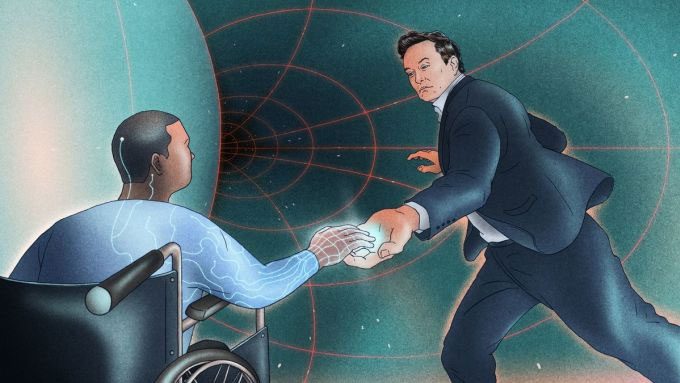Elon Musk announced that the first brain chip test subject from Neuralink has successfully controlled a computer mouse using just their thoughts.
On social media platform X on February 20, Musk stated that the brain chip implant patient is progressing well and seems to have fully recovered their nervous system. In addition to moving the mouse around the screen, Neuralink is attempting to help this individual click as many times as possible.
Last month, Neuralink successfully implanted a brain chip in its first trial participant after receiving approval from regulatory authorities. The company describes this as an important milestone for the future, as the technology is being applied to assist more people.

Illustration of a Neuralink brain chip potentially assisting wheelchair-bound patients. (Photo: VOX).
Neuralink reported that they utilized robots to perform the surgery, placing the brain-computer interface implant into the brain. The surgery involved hours of skull removal, followed by 25 minutes for the robot to insert the device along with a super-thin chip component containing approximately 64 different threads. These threads are only 1/14 the width of a human hair. The initial goal is to allow patients to control the cursor or computer keyboard using their thoughts.
According to Reuters, Musk has grand ambitions for Neuralink. He believes that this technology will facilitate quick surgical implantation of their chips to address conditions such as obesity, autism, depression, and schizophrenia.
Musk also mentioned another application of brain chip implantation, which is to restore vision to the visually impaired, naming it BlindSight. He noted that the implant could “transmit vision directly to the brain by stimulating the visual parts of the cortex, creating images of the world before the patient’s eyes.”
One of Musk’s more unusual claims about Neuralink is the potential to connect the human brain to computers and the Internet, thereby helping to prevent a “potential AI apocalypse.” In 2019, Musk stated that humans would “merge with AI to achieve a symbiosis with artificial intelligence.” According to him, this would allow humans to enhance their cognitive abilities to a superhuman level, on par with AI in the future.
However, computer security expert Roger Grimes cautioned that Musk’s technology could be vulnerable to hacking. “History has shown that most, if not all, implanted medical devices and previous chips can be hacked,” Grimes told The Sun. “There is no reason to believe that Neuralink’s chip will be any different.”
He stated that the most secretive aspect at this point is that cybercriminals do not know which operating system Neuralink’s chip is using, its specifications, or whether it can be updated. It has not been hacked yet, provided it uses uncommon software or possesses defenses against attacks. “Previous hacks of medical devices have shown that hackers can manipulate operations in malicious ways, potentially endangering the lives of those wearing them,” Grimes emphasized. “Depending on how the brain chip is used, the consequences could be fatal.”
Neuralink was co-founded by Elon Musk in 2016 along with seven other members, though most have since departed. Last May, the company received approval from the U.S. Food and Drug Administration (FDA) to implant chips in humans.
Despite the potential to change the world and open up possibilities such as telepathy or a symbiosis with AI, Neuralink’s brain chip technology has not been warmly received by the American public. According to a survey from data analysis and market research company YouGov, only 8% of respondents would consider having a chip implanted in their brains, while 82% said no and 10% were undecided.


















































